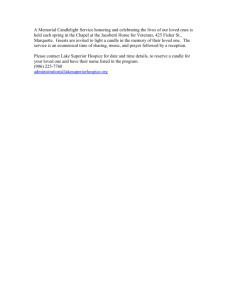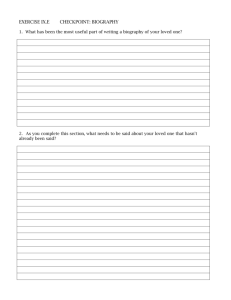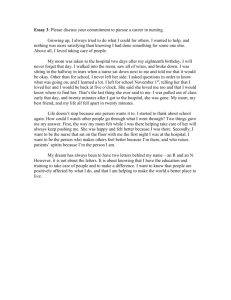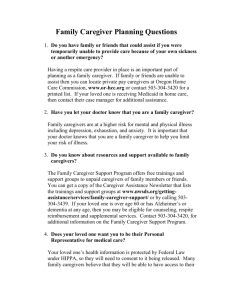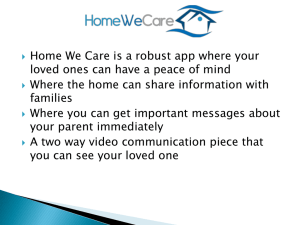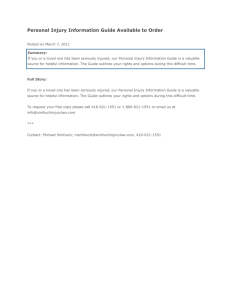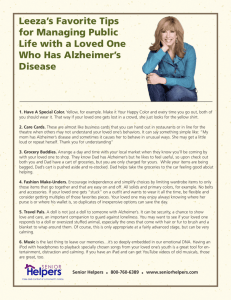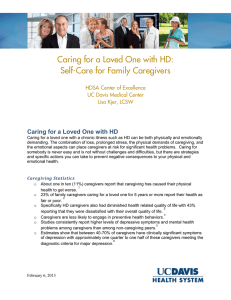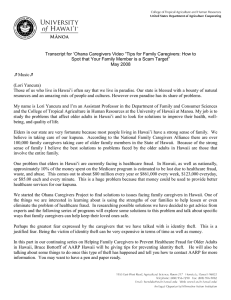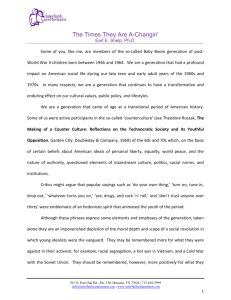caregivers - Relay For Life
advertisement
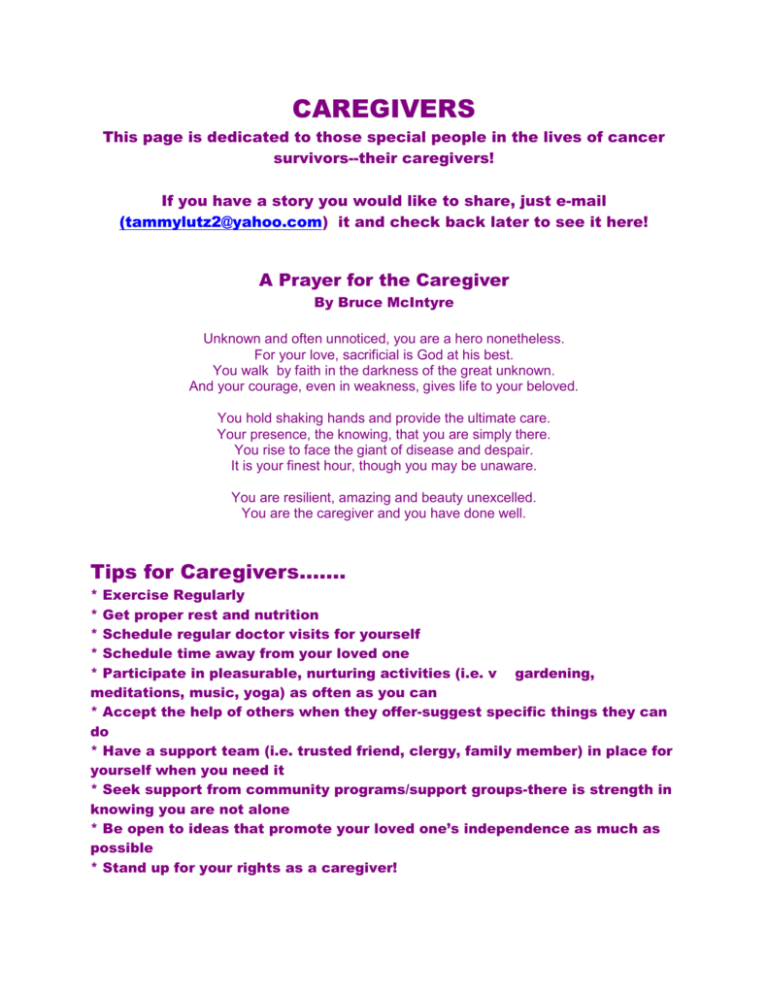
CAREGIVERS This page is dedicated to those special people in the lives of cancer survivors--their caregivers! If you have a story you would like to share, just e-mail (tammylutz2@yahoo.com) it and check back later to see it here! A Prayer for the Caregiver By Bruce McIntyre Unknown and often unnoticed, you are a hero nonetheless. For your love, sacrificial is God at his best. You walk by faith in the darkness of the great unknown. And your courage, even in weakness, gives life to your beloved. You hold shaking hands and provide the ultimate care. Your presence, the knowing, that you are simply there. You rise to face the giant of disease and despair. It is your finest hour, though you may be unaware. You are resilient, amazing and beauty unexcelled. You are the caregiver and you have done well. Tips for Caregivers……. * Exercise Regularly * Get proper rest and nutrition * Schedule regular doctor visits for yourself * Schedule time away from your loved one * Participate in pleasurable, nurturing activities (i.e. v gardening, meditations, music, yoga) as often as you can * Accept the help of others when they offer-suggest specific things they can do * Have a support team (i.e. trusted friend, clergy, family member) in place for yourself when you need it * Seek support from community programs/support groups-there is strength in knowing you are not alone * Be open to ideas that promote your loved one’s independence as much as possible * Stand up for your rights as a caregiver! Getting and Staying Organized Keep track of care giving responsibilities can be daunting. Staying organized can help you care for your loved one or friend and can maximize the amount of quality time you and your loved one spend together. Making lists of important information can be an easy way to help keep organized and can be very useful in case of an emergency. For example, you might make a list of the things you need to morning and bedtime routines such as bathing items, medications and clothing. These lists can be put into a clearly marked notebook and kept where others can easily find them. This notebook should contain enough information so that someone filling in for you will know exactly what is needed and what to do. Consider making a list for each of the topics below: * The name, specialty, phone number and address of each key medical provider. * The phone numbers for healthcare agencies you commonly interact with * The names and phone number for friends, family members and community support * Lawyers and financial advisors that you are connected with * Where needed items are kept, such as thermometers and blood pressure monitors * Medications, when they are to be taken and where they are stored * Exercise schedules and directions * Emergency contacts in addition to 911 STARTING THE CONVERSATION: APPROACHES FOR HELPING YOUR LOVED ONES By Chris Cremean, LSW Caregivers need all the help they can get. One of the most difficult barriers to helping a loved one is knowing the best approaches to addressing the issues that need to be addressed. It all comes down to building or in some cases, rebuilding relationships with those loved ones. There are three areas that need to be tackled: communication, planning and family dynamics. COMMUNICATION There is the direct approach to communication: “You NEED to do this, “ “You SHOULD make out a will or plan your funeral arrangements”. The problem with this approach is that most people don’t want people TELLING them what to do. They will be more apt to tune them out and not pursue the thing you are trying to get them to do. A more effective approach is the indirect one. Don’t be confrontational. Make suggestions that the person look into the subject or point out experiences that others had with the area of concern and how it worked out (or didn’t) in their case. “Cousin Ned sure was glad that Aunt Mable made out that advanced directive in deciding how to handle Uncle Fred’s stroke”. This will place the idea in a person’s head and sometimes they will bring it up themselves at a time when they are ready to deal with it. The most important thing in communication is to keep doing it! Think of it as an ongoing discussion and not a “We have to get this done and move on”> Most decisions are for something in the future. PLANNING Timing is everything. Remember the indirect communication approach. Crisis can be avoided by planning for the future. Always remember who the planning is for. Each of us wants to have the final say in any decision that affects us directly. Your role is to help bring the information to the person so they can make an informed decision. You will also know what’s what by doing this. Be aware that government benefits have a bias towards institutional care, not the place of choice-home, finances will dictate options at various points in the life journey, income, resources, insurance, benefit programs. FAMILY DYNAMICS To a parent, you will ALWAYS be the child. Look around and see what supports are there. Reach out to siblings, relatives, friends and service providers. The most successful people to deal with care giving situations are those who build a strong team of support and don’t try to go it alone. This will also allow for these those involved to keep from getting stressed out. Above all, remember, BE THERE AND BE SUPPORTIVE Chris Cremean, Ohio Licensed Social Worker, has assisted both individuals and their families in both nursing home and home care settings for more than 30 years. CAREGIVER FAMILY CHECKLIST The most loving gift a person can give to one’s family is to put your affairs in order before a disaster or medical emergency. To assist in providing that gift, the following list has been compiled. The information and documents you should have prepared. * All bank accounts, account numbers and types of accounts and the location of banks. * Insurance Company, policy number, beneficiary as stated on the policies and type of insurance (health, life, long term care, automobile, etc) * Deed and titles to ALL property. * Loan/lien information, who holds them and if there are any death provisions. * Social Security and Medicare numbers * Military history, affiliations and papers (including discharge papers) * Up-to-date will in a safe place (inform family where the Will is located) * Living Will or other Advanced Directive appropriate to your state of residence. * Durable Power of Attorney * Instructions for funeral services and burial (if arrangements have been secured, name and location of funeral home).
